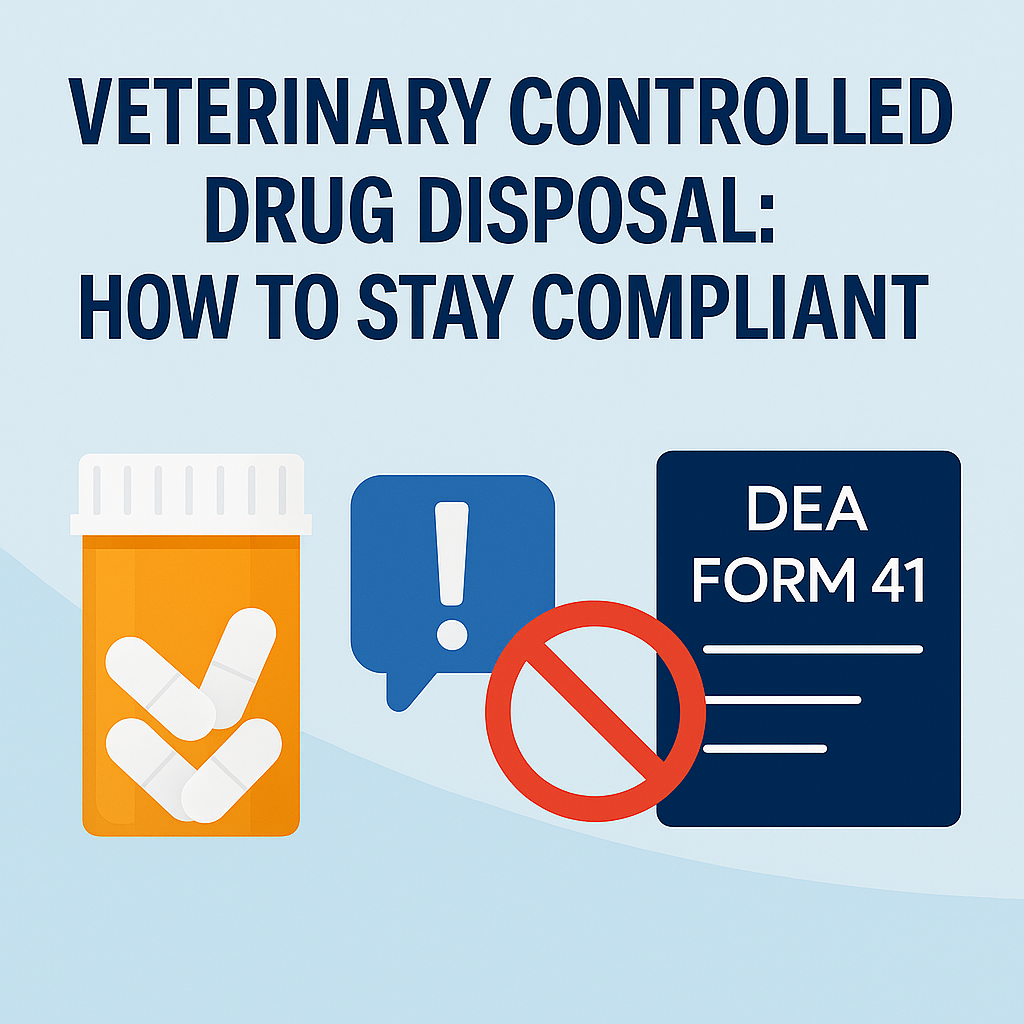How to Dispose of Controlled Drugs for Correctional Facilities
How to Dispose of Controlled Drugs for Correctional Facilities Correctional facilities, including prisons, jails, and detention centers, routinely...
3 min read
William Doxey
:
Sep 21, 2025 8:27:13 PM

Veterans Affairs (VA) facilities manage a wide range of controlled substances, including opioids, sedatives, and psychiatric medications, to provide care for veterans. While these medications are critical for treatment, they also come with strict DEA, federal, and state compliance obligations.
Improper disposal of controlled drugs can lead to regulatory violations, environmental harm, and the risk of diversion, making it crucial for VA facilities to have a robust, compliant disposal program.
This guide explains how VA facilities can safely, legally, and efficiently dispose of controlled drugs, while maintaining full compliance with all regulations.
Learn More:
Looking for the Best Pharmaceutical Disposal Companies: Safe & DEA-Compliant?
What is a DEA Forms 222, 41, and COD Explained?
What are the Best Drug Disposal Companies: Safe & DEA-Compliant or the Best Reverse Distributors?
Controlled drugs are categorized by the Drug Enforcement Administration (DEA) into five schedules based on their risk of abuse and medical utility. VA facilities often handle:
| Schedule | Common Medications | Use |
|---|---|---|
| Schedule II | Morphine, Fentanyl, Hydromorphone | Pain management |
| Schedule III | Buprenorphine, Ketamine | Moderate pain, anesthesia |
| Schedule IV | Diazepam, Lorazepam | Anxiety, insomnia, muscle spasms |
| Schedule V | Low-dose opioids, cough syrups | Symptom management |
Strict adherence to DEA regulations, federal guidelines, and VA policies is essential to prevent misuse or diversion.
Failing to properly dispose of controlled drugs in VA facilities can result in:
DEA fines or loss of DEA registration
Audit failures or compliance violations
Diversion of medications by staff or patients
Environmental contamination, particularly affecting water supply
Legal and reputational risk
Proper disposal protects veterans, staff, and the environment while maintaining regulatory compliance.
The safest and most scalable option for VA facilities:
Collects and destroys Schedule I–V drugs
Handles DEA Form 222 for Schedule II
Provides DEA Form 41 and Certificates of Destruction
Maintains full chain-of-custody
Benefits:
Reduces diversion and theft risk
Ensures full compliance with DEA and state regulations
Flexible for high-volume VA facilities
Example: Easy Rx Cycle offers secure, nationwide DEA-compliant reverse distribution for VA facilities.
Some facilities may choose on-site destruction under strict DEA rules:
Drugs must be rendered irretrievable
Must be witnessed by two authorized personnel
Complete DEA Form 41 documentation
Records stored for at least 2 years
⚠️ High-risk and recommended only if robust compliance systems are in place.
Mail-back programs offer a convenient, low-risk option:
Tamper-proof containers
Prepaid shipping to licensed disposal vendors
Includes all necessary DEA documentation
Advantages:
Reduces storage and handling
Maintains DEA compliance
Ideal for smaller or satellite VA clinics
| Form | Purpose |
|---|---|
| DEA Form 222 | Transfer of Schedule II drugs to reverse distributors |
| DEA Form 41 | Documentation of destruction for Schedule I–V drugs |
| Certificate of Destruction (COD) | Proof of proper disposal for audits |
Proper retention of these forms is essential for VA audits and regulatory compliance.
Flushing controlled substances (illegal and environmentally harmful)
Throwing medications into regular trash or medical waste
Incomplete DEA Forms 222 or 41
Lack of witness signatures for on-site destruction
Working with unlicensed vendors
Partnering with a DEA-compliant service like Easy Rx Cycle helps VA facilities avoid these pitfalls.
✅ Maintain accurate controlled substance logs
✅ Review medication inventory regularly
✅ Segregate expired, unused, or damaged drugs
✅ Use a DEA-registered reverse distributor for Schedule I–V drugs
✅ Complete DEA Form 222 for Schedule II transfers
✅ Complete DEA Form 41 and obtain Certificates of Destruction
✅ Retain all records for at least 2 years
✅ Use mail-back programs for smaller or remote clinics
Proper disposal:
Prevents drug diversion by staff or patients
Protects water supply and environment
Supports environmentally protective pharmaceutical waste management
Ensures full regulatory compliance
Easy Rx Cycle provides:
DEA-authorized reverse distribution for controlled drugs
Mail-back programs for smaller units
Complete DEA Form 222, 41, and COD support
Nationwide service with flat-rate pricing and no contracts
Whether handling opioids, sedatives, or psychiatric medications, Easy Rx Cycle simplifies compliant controlled drug disposal for VA facilities.
Q: Can VA facilities flush controlled drugs?
A: No. Flushing is illegal and environmentally hazardous. Use DEA-compliant disposal methods.
Q: How often should controlled drugs be disposed of?
A: Typically every 30–90 days depending on inventory. Reverse distributors can schedule regular pickups.
Q: What DEA forms are required?
A: DEA Form 222 (Schedule II), DEA Form 41 (Schedule I–V destruction), and Certificates of Destruction.
Q: What is a reverse distributor?
A: A DEA-registered company that securely collects, transports, and destroys controlled drugs.
Q: Are mail-back programs acceptable for VA facilities?
A: Yes, for low-volume or satellite units, mail-back programs are DEA-compliant and reduce handling risks.
Ensure safety, compliance, and security:
DEA-authorized reverse distribution
Mail-back programs for small units
Full DEA Form 222, 41, and COD documentation
Nationwide service, flat-rate pricing, no contracts
📞 Request a Quote or Free Mail-Back Kit:
👉 Request a Quote
👉 Call (501) 904-2929
Make controlled drug disposal safe, compliant, and hassle-free.

How to Dispose of Controlled Drugs for Correctional Facilities Correctional facilities, including prisons, jails, and detention centers, routinely...

Reverse Distribution for Pharmacies: How to Dispose of Controlled Drugs Pharmacies handle a wide range of controlled substances, from opioids to...